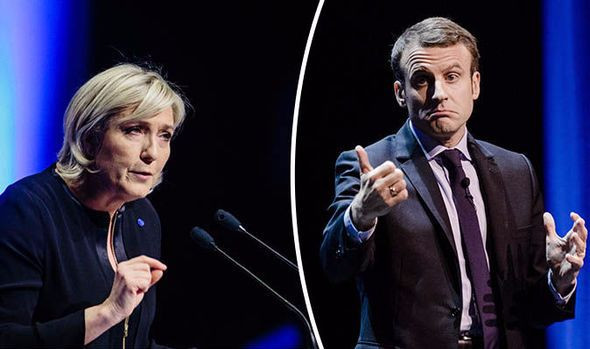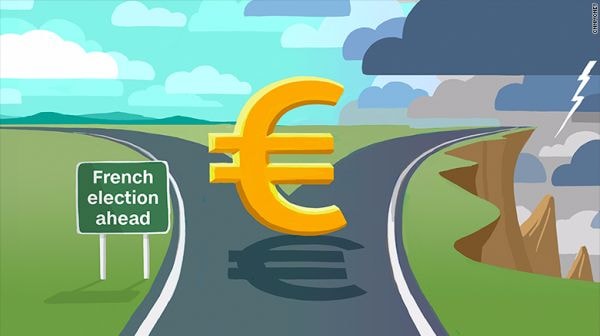Economic war in the political arena
(Baonghean) - The French general election is clearly a battle between two completely different economic views, promising to bring about many huge impacts on Europe. That is what analysts commented after the first live televised debate between the two leading candidates running for the French presidency, Marine Le Pen and Emmanuel Macron.
Le Pen, a member of the far-right National Front party, has expressed his desire for France to abandon the euro and protect French jobs. Meanwhile, Macron, a former French economy minister and banker, is a staunch supporter of open borders and greater European integration.
 |
| Le Pen and Macron - who will win the first round of the French election next April? Photo: Getty. |
On important issues related to Europe, trade or tariffs, the two politicians pursue different directions. Their economic views will influence the votes of voters, and that will be the factor that will make the race increasingly heated in French politics.
The euro or the new franc?
For her part, Le Pen wants to hold a referendum on France's membership in the European Union, similar to what Britain did last year. The powerful woman has proposed ditching the euro and instead switching to a "new franc" with a lower value to make French exports more competitive. If this happens, it would also mean that France's current public debt would be converted into the new currency - a move that CNN Money says could be considered a default.
In an appearance earlier this week, Le Pen also stressed: “The European Union bans us everything, punishes us, reprimands us – and the end result is unemployment and poverty.” Le Pen’s stance on the euro came under fire during the debate on March 20, with rival candidates accusing her of bringing about economic disaster. In response, Le Pen said her critics were spreading fear.
Macron, on the other hand, has campaigned on maintaining France’s centrality in Europe. He has therefore maintained his support for deeper integration among the countries that share the euro. He has also vowed to push for reform of the monetary union, and has even called for the eurozone to create its own budget.
Free trade or France first?
Macron is a strong advocate of free trade and has campaigned for the European Union-Canada Free Trade Agreement (CETA). However, he believes that Europe should be cautious about new agreements and should not compromise the bloc’s standards on security, social protection and the environment. He has also spoken out against re-imagining borders in Europe, along with his desire for stronger, deeper integration within the trading bloc.
 |
| The future of the euro is a matter of concern for French presidential candidates. Photo: CNN. |
Meanwhile, on Monday, Ms Le Pen argued that priority should be given to French companies when bidding for public contracts, and that more practical steps were needed to protect jobs at home.
According to the National Front candidate, “the French state must give priority to French companies, not foreign ones.” She also made it clear: “I am not here to create jobs for neighboring countries.”
As proof of her words, Le Pen outlined plans to give special labels to "Made in France" products to increase their market appeal. In addition, the candidate intends to impose import taxes on products from companies that move jobs out of France, hiring cheaper labor abroad.
New free trade deals have also failed to get a nod from Le Pen, and her party has outlined a series of policies that have been described as “smart protectionism”.
Tax cuts for businesses or employees?
This is another issue where the two leading candidates in the French election campaign are on opposite sides of the “battle line”. In contrast to Le Pen, who is seeking to cut income tax on the most disadvantaged workers, simplify tax regulations and fight tax evasion, along with a commitment to introduce a new tax on companies hiring immigrants with the aim of encouraging businesses to hire French workers, Macron has taken a completely different approach in this aspect. Not only has he promised to gradually cut corporate income tax from the current 33% to the expected figure of 25%, Macron also cherishes the plan to reduce local land use tax for the majority of French people and reform property tax.
In addition, he has pledged to cut public spending by €60 billion a year, partly through reforms to make the government more efficient. And if elected, Macron would “brutally” streamline 120,000 state employees by not hiring new people when they retire.
Another difference is that while Le Pen intends to lower the official retirement age to 60 and encourage businesses to hire more workers, for example by reducing corporate income tax, Macron is considering changing the way France applies its current 35-hour workweek.
Explaining his directions, he shared: “I simply propose negotiating the issue of working hours. There needs to be flexibility and freedom, we will create jobs by giving freedom to companies and social dialogue organizations.”
Fiscal stimulus or currency devaluation?
Finally, with this question, Macron has “ready” clear plans for a large economic stimulus package that he says will quickly change the face of the French economy. Accordingly, he wants to spend 50 billion euros over 5 years on the fields of training, energy and environment, transport, health and agriculture. And of course, his opponent is loyal to the view of promoting an independent France and an undervalued currency, arguing that this is what will bring a strong boost to the economy.
Just by looking at 4 basic questions related to the economic field, we can clearly imagine 2 different viewpoints, even quite fiercely opposed between 2 leading names in the minds of French voters today. The heat on the race is gradually becoming apparent, as time is getting shorter, it is also the time for opponents to show themselves more. And so, from now on, a voter responsible for the future of France will have to think quite a bit before putting pen to paper on his ballot.
Thu Giang
(According to CNN)
| RELATED NEWS |
|---|
